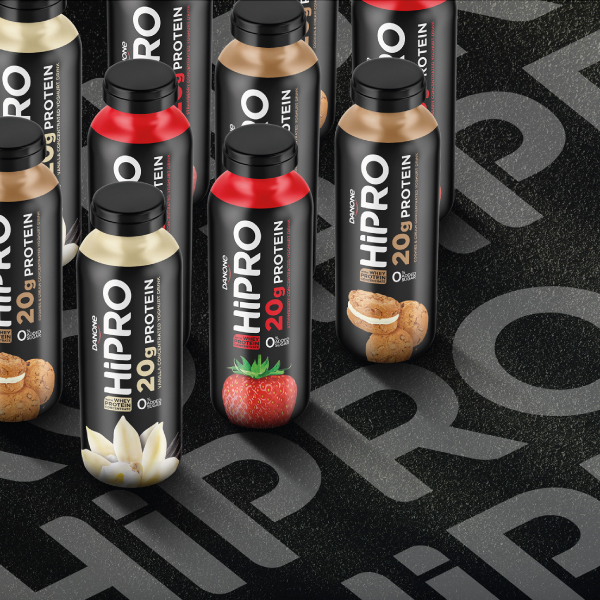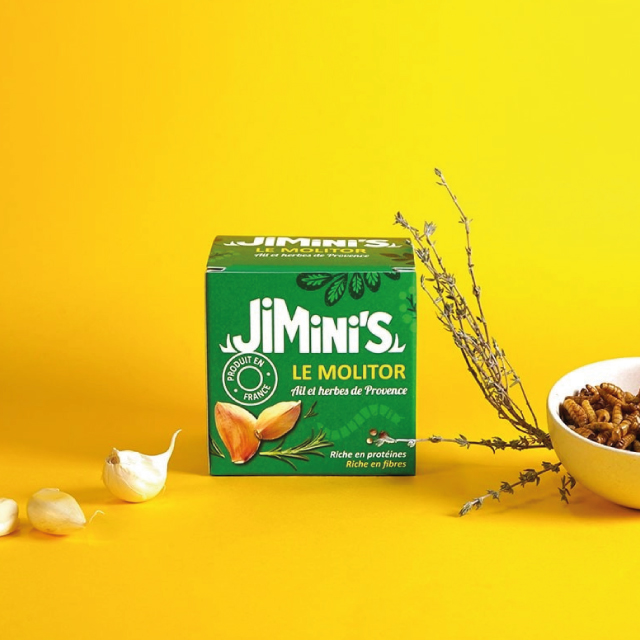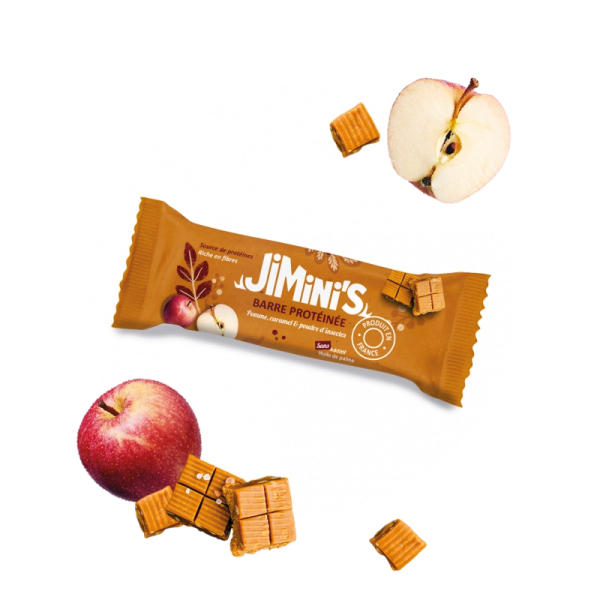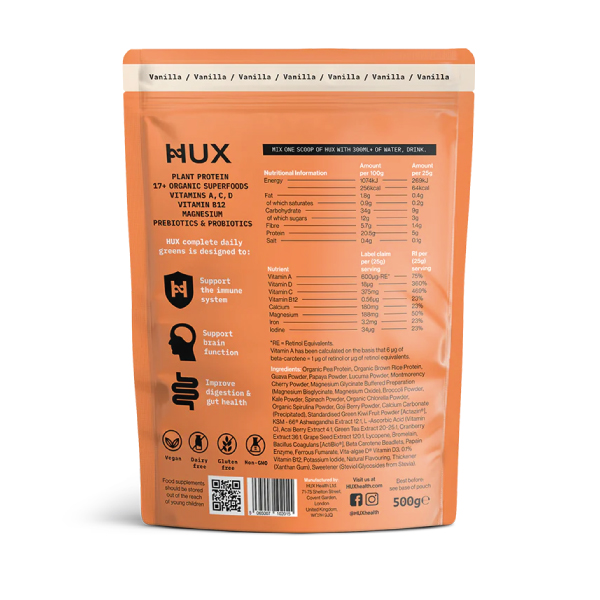Consumer expectations constantly evolve, and new culinary trends are emerging on the gastronomic scene. Today, the quest for protein-rich foods is no longer confined to athletes but has become an important purchasing criterion for the general public.
By 2024, 19% of Americans would like to increase their protein intake, a preference that ranks third after fruits and vegetables. Additionally, over 50% believe that protein content is the most important nutritional factor when purchasing snacks. (Stylus Natural Expo West 2024 report)
Consumer expectations constantly evolve, and new culinary trends are emerging on the gastronomic scene. Today, the quest for protein-rich foods is no longer confined to athletes but has become an important purchasing criterion for the general public.
By 2024, 19% of Americans would like to increase their protein intake, a preference that ranks third after fruits and vegetables. Additionally, over 50% believe that protein content is the most important nutritional factor when purchasing snacks. (Stylus Natural Expo West 2024 report)
This trend is also confirmed on social networks, making nutritional education accessible and “democratizing” the protein, by no longer associating it exclusively with sporting performance. The pandemic has also raised awareness of the importance of physical and mental health. Online content, such as workouts and recipes at home, have contributed to this transformation of mentalities. Well-being comes first, and we say yes to protein!
Faced with the increasing popularity of this new trend, food brands are now offering alternatives that can be enjoyed at any time, not just in the context of sports performance.
This trend is also confirmed on social networks, making nutritional education accessible and “democratizing” the protein, by no longer associating it exclusively with sporting performance. The pandemic has also raised awareness of the importance of physical and mental health. Online content, such as workouts and recipes at home, have contributed to this transformation of mentalities. Well-being comes first, and we say yes to protein!
Faced with the increasing popularity of this new trend, food brands are now offering alternatives that can be enjoyed at any time, not just in the context of sports performance.
Magic Spoon offers cereal-based snacks with a high protein content (between 11 to 13%) that can be enjoyed throughout the day. The packaging is inspired by the nostalgia of the cereals we used to eat on Saturday mornings while watching our favorite cartoons. It is colorful and fun, catching the eye and curiosity of consumers, and encouraging them to make a purchase. The protein content is prominently displayed on the packaging, providing reassurance to the consumer.
New players are entering the market, yet the leading players in the food industry have not finished surprising us!
Credit: Magic Spoon
Magic Spoon offers cereal-based snacks with a high protein content (between 11 to 13%) that can be enjoyed throughout the day. The packaging is inspired by the nostalgia of the cereals we used to eat on Saturday mornings while watching our favorite cartoons. It is colorful and fun, catching the eye and curiosity of consumers, and encouraging them to make a purchase. The protein content is prominently displayed on the packaging, providing reassurance to the consumer.
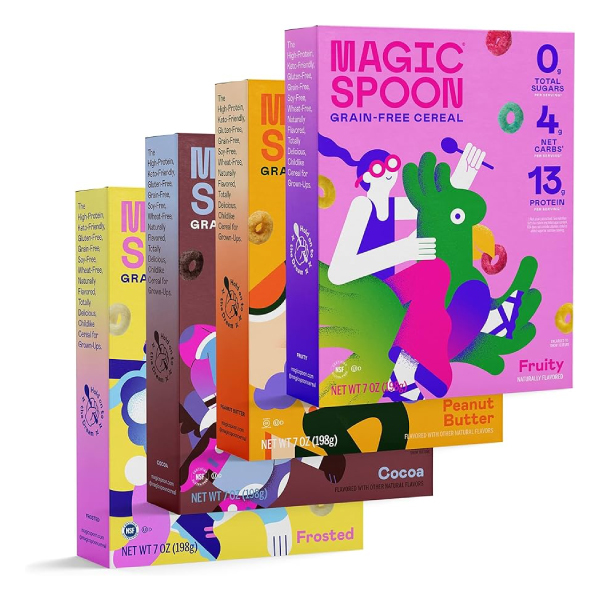
Magic Spoon offers cereal-based snacks with a high protein content (between 11 to 13%) that can be enjoyed throughout the day. The packaging is inspired by the nostalgia of the cereals we used to eat on Saturday mornings while watching our favorite cartoons. It is colorful and fun, catching the eye and curiosity of consumers, and encouraging them to make a purchase. The protein content is prominently displayed on the packaging, providing reassurance to the consumer.
New players are entering the market, yet the leading players in the food industry have not finished surprising us!
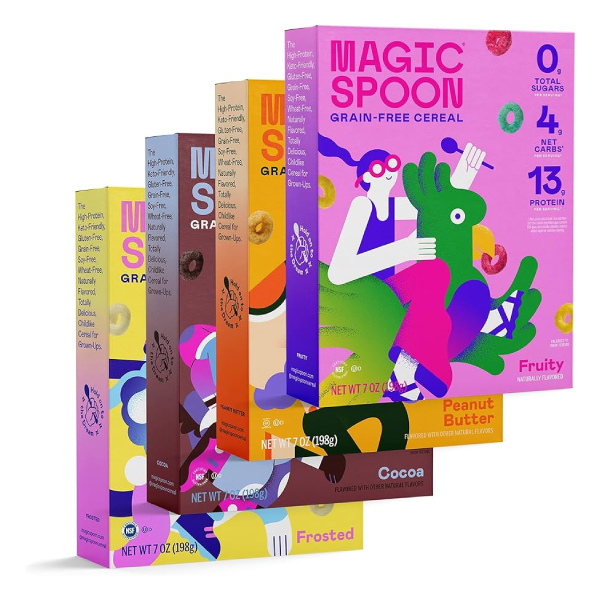
Credit: Magic Spoon
New players are entering the market, yet the leading players in the food industry have not finished surprising us!
Credit: Hi Pro, Danone (Oz Design)
Danone specializes in protein foods with its Hi Pro brand. The brand offers a wide range of protein products, from yogurt drinks to gourmet desserts. When choosing protein foods, consumers seek reassurance. Hi Pro, with its sober packaging that highlights the product’s protein content and main ingredient, understands this need. The brand emphasizes transparency by designing clear, informative, and straightforward packaging that reassures consumers.
Danone specializes in protein foods with its Hi Pro brand. The brand offers a wide range of protein products, from yogurt drinks to gourmet desserts. When choosing protein foods, consumers seek reassurance.
Hi Pro, with its sober packaging that highlights the product’s protein content and main ingredient, understands this need. The brand emphasizes transparency by designing clear, informative, and straightforward packaging that reassures consumers.
Credit: Hi Pro, Danone (Oz Design)
Danone specializes in protein foods with its Hi Pro brand. The brand offers a wide range of protein products, from yogurt drinks to gourmet desserts. When choosing protein foods, consumers seek reassurance.
Hi Pro, with its sober packaging that highlights the product’s protein content and main ingredient, understands this need. The brand emphasizes transparency by designing clear, informative, and straightforward packaging that reassures consumers.
Credit: Hi Pro, Danone (Oz Design)
FoodTech players are also entering the scene, enabling food markets to innovate and offer healthy food alternatives. This growing demand for high-protein snacks is accompanied by consumers concerned about their impact on the environment and animal welfare.
Despite a certain mistrust of “processed” products, particularly in terms of nutritional content, several brands are emerging in the market, offering protein-rich vegetable and pulse-based alternatives to counter preconceived ideas.
FoodTech players are also entering the scene, enabling food markets to innovate and offer healthy food alternatives. This growing demand for high-protein snacks is accompanied by consumers concerned about their impact on the environment and animal welfare.
Despite a certain mistrust of “processed” products, particularly in terms of nutritional content, several brands are emerging in the market, offering protein-rich vegetable and pulse-based alternatives to counter preconceived ideas.
Agro pioneered a solution: Power Jerky: high protein snacks with lower salt levels.
Thanks to the Sprint Mode™ tool, developed by CBA’s USA-based teams, our teams and AGRO’s worked together to develop a striking graphic system and a solid marketing strategy in just 6 weeks! The graphic system resonates with the product’s ethos and founders, aiming to tackle concerns about the environmental impact of meat production.
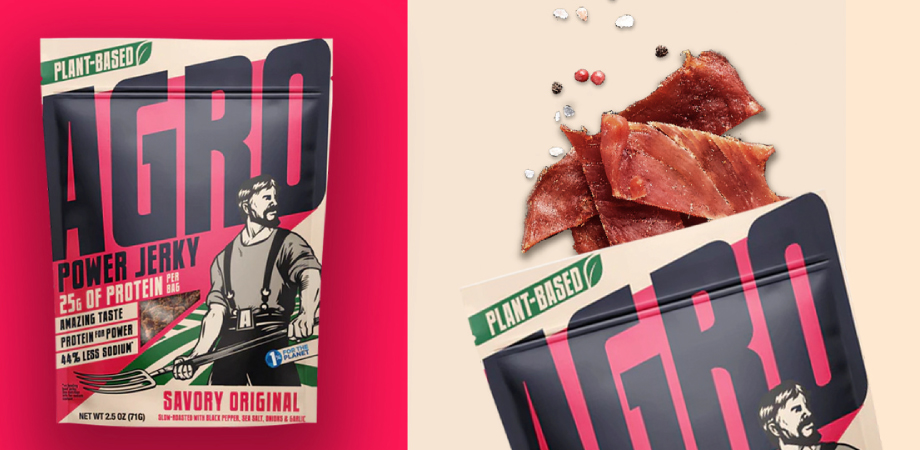
Agro pioneered a solution: Power Jerky: high protein snacks with lower salt levels.
Thanks to the Sprint Mode™ tool, developed by CBA’s USA-based teams, our teams and AGRO’s worked together to develop a striking graphic system and a solid marketing strategy in just 6 weeks! The graphic system resonates with the product’s ethos and founders, aiming to tackle concerns about the environmental impact of meat production.
Agro pioneered a solution: Power Jerky: high protein snacks with lower salt levels.
Thanks to the Sprint Mode™ tool, developed by CBA’s USA-based teams, our teams and AGRO’s worked together to develop a striking graphic system and a solid marketing strategy in just 6 weeks! The graphic system resonates with the product’s ethos and founders, aiming to tackle concerns about the environmental impact of meat production.

Product innovation is constantly growing and evolving. By proposing a new way of consuming, brands seek to stand out from the crowd and carve out a solid place for themselves in the food market, while responding to today’s challenges such as the climate emergency and animal welfare.
Product innovation is constantly growing and evolving. By proposing a new way of consuming, brands seek to stand out from the crowd and carve out a solid place for themselves in the food market, while responding to today’s challenges such as the climate emergency and animal welfare.
Credit: Jiminis
Jiminis offers protein-rich insect-based foods. These include bars, granolas, and crackers. This new form of insect-based food provides many essential nutrients, while diversifying taste experiences thanks to new food textures and shapes.
Unlike Danone with its Hi Pro brand, Jiminis opts for a different approach, displaying the words “Rich in protein” on the front of its packaging and detailing the nutritional percentages on the back. Jiminis relies on colorful, peppy packaging to attract the eye and curiosity of consumers and encourage them to find out more about the product and the brand.
Unlike Danone with its Hi Pro brand, Jiminis opts for a different approach, displaying the words “Rich in protein” on the front of its packaging and detailing the nutritional percentages on the back. Jiminis relies on colorful, peppy packaging to attract the eye and curiosity of consumers and encourage them to find out more about the product and the brand.
Unlike Danone with its Hi Pro brand, Jiminis opts for a different approach, displaying the words “Rich in protein” on the front of its packaging and detailing the nutritional percentages on the back. Jiminis relies on colorful, peppy packaging to attract the eye and curiosity of consumers and encourage them to find out more about the product and the brand.
Always striving to differentiate themselves from the competition, brands specializing in nutrition are seeking to win over customers by offering packaging that encourages interaction. As we already mentioned in our article on connected packaging, which you can read here, the packaging is a crucial point of brand activation, bridging the gap between the real and digital worlds and offering a differentiating and memorable experience.
Hux, which specializes in health and wellness supplements that cater to various nutritional needs such as hydration, sleep, and protein, has decided to introduce QR codes on its packaging, offering a more precise and exhaustive description of its products.
Credit: Hux
Always striving to differentiate themselves from the competition, brands specializing in nutrition are seeking to win over customers by offering packaging that encourages interaction. As we already mentioned in our article on connected packaging, which you can read here, the packaging is a crucial point of brand activation, bridging the gap between the real and digital worlds and offering a differentiating and memorable experience.
Hux, which specializes in health and wellness supplements that cater to various nutritional needs such as hydration, sleep, and protein, has decided to introduce QR codes on its packaging, offering a more precise and exhaustive description of its products.
Credit: Hux
Always striving to differentiate themselves from the competition, brands specializing in nutrition are seeking to win over customers by offering packaging that encourages interaction. As we already mentioned in our article on connected packaging, which you can read here, the packaging is a crucial point of brand activation, bridging the gap between the real and digital worlds and offering a differentiating and memorable experience.
Connected packaging offers transparency and reassures consumers about their consumption choices. Additionally, it serves as a powerful tool for gathering data and consumer information, enabling brands to adjust their strategy in real time to reach their target audience.
Connected packaging offers transparency and reassures consumers about their consumption choices. Additionally, it serves as a powerful tool for gathering data and consumer information, enabling brands to adjust their strategy in real time to reach their target audience.
As you can imagine, consumer habits are constantly evolving. It’s crucial to meet consumers’ dietary objectives while respecting their values, from the environment to animal welfare. Packaging is the key to clearly conveying nutritional attributes and illustrating your transparency to your consumers.
As you can imagine, consumer habits are constantly evolving. It’s crucial to meet consumers’ dietary objectives while respecting their values, from the environment to animal welfare. Packaging is the key to clearly conveying nutritional attributes and illustrating your transparency to your consumers.
To discover more trends, download right now our 2024 Useful Design Trends report.
To discover more trends, download right now our 2024 Useful Design Trends report.

